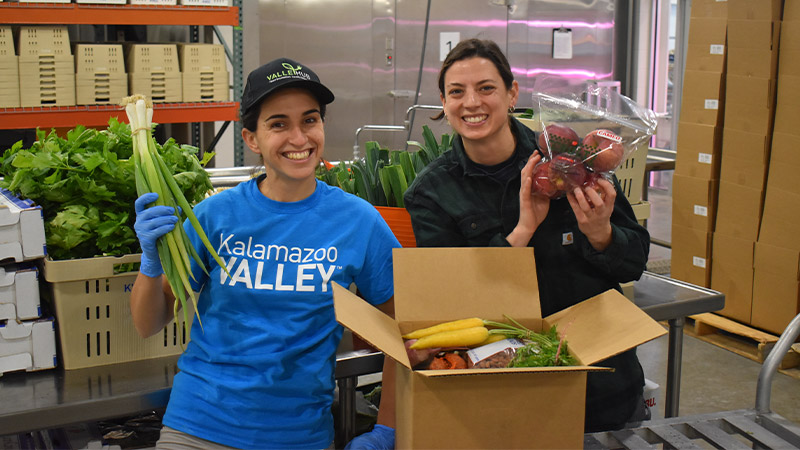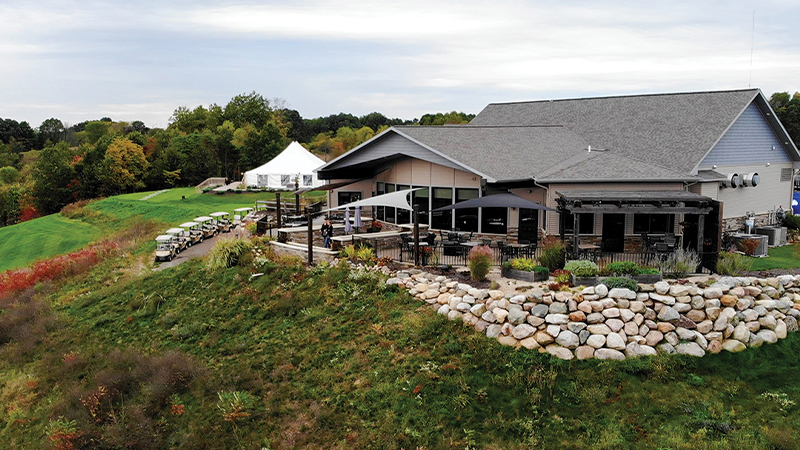Photo caption: Kalamazoo Valley Community College’s Valley Hub employees Hristina Petrovska, food systems program coordinator, and Claire Michael, food hub flex tech, display some of the fresh vegetables that are ready for processing.
The Food Innovation Center at Kalamazoo Valley Community College was recently awarded $3.2 million in federal funding to provide local food to in-need members of the community.
Food will be purchased through the college’s ValleyHUB food hub based at the center, building on relationships with more than 30 regional farmers and food makers.
“The grant aims to simultaneously support local growers and makers and reduce hunger, with a focus on reaching socially disadvantaged communities through innovative and supportive food distribution models,” explained Rachel Bair, director for sustainable and innovative food systems for Kalamazoo Valley.
Funds have been made available through the federal Local Food Purchase Assistance Cooperative Agreement Program (LFPA), which will be administered in Michigan by the Michigan Department of Education. The program’s goals are to make local food systems stronger and more equitable, and to reduce food insecurity.
“Making purchases from local farmers and makers, especially those who have been historically disadvantaged, helps them invest in growing their businesses. Over time, these purchases will help farms flourish in Southwest Michigan,” Bair said. “And meanwhile, the food will feed our neighbors.”
Food purchased under the grant will be distributed to food-insecure households, providing them with fresh, nutritious, easy-to-prepare foods. It will also supplement the college’s existing Valley Food Share food program that provides weekly boxes of food to current Kalamazoo Valley Community College students.
How it will work
Kalamazoo Valley’s Food Innovation Center is a food hub, urban farm, and educational center working with the community to strengthen the local food system. Center staff will lead outreach to and purchasing from the food hub’s network of regional farmers and food producers.
Food distribution will be led by Sprout BC and Kalamazoo Loaves & Fishes, two organizations with deep connections to the community and years of experience addressing food insecurity. Additional partnerships are being established in Berrien and Van Buren counties.
Sprout BC is an organization working to strengthen local food systems, serving Calhoun County and surrounding areas. This grant will enable staff to expand their food-box delivery programs to additional sites in Calhoun, Branch, and Kalamazoo counties, as well as add pop-up market events within these communities.
Kalamazoo Loaves & Fishes provides fresh foods and non-perishables through a network of pantries, home deliveries, school-based programming, mobile food distributions, and partner agencies in Kalamazoo County. This grant will enable Loaves & Fishes to increase offerings of fresh food by expanding the scope of its hunger-relief program elements. “We will work with community groups and leaders in order to continue understanding how this project can best serve Southwest Michigan,” Bair said.
Wide-ranging project
Kalamazoo Valley is one of eight organizations receiving LFPA funds in the state of Michigan. The college’s work will focus on the Southwest Michigan region. Other participating organizations include: the Food Bank Council of Michigan, which will provide locally-produced home-delivered meals in the Upper Peninsula; Eastern Market, which will distribute fresh produce boxes in the Detroit Metro area; and Michigan State University’s College of Agriculture and Natural Resources, which will provide evaluation services for the grant.
“The Michigan Department of Education is excited to partner with these eight organizations around the state to ensure that our families and children most in need have improved access to fresh and healthy foods,” said State Superintendent Michael Rice, Ph.D. “At the same time, we are pleased that this effort permits us to support underserved farmers and food producers.”
Food purchases and distributions will start this summer and continue until at least October 2024. Food purchases will be made from regional farms through our regular food hub channels. This will mean increased demand for existing suppliers, as well as opportunities for new producers to participate with the hub. Interested suppliers should reach out to valleyhub@kvcc.edu.
Food needs will be identified by Sprout BC and Kalamazoo Loaves & Fishes and other community partners to be announced soon, working closely with community members and community leadership to understand what food is needed when and where. Interested community organizations should also reach out to valleyhub@kvcc.edu.
More information will be forthcoming on how community members can access this food, and will be posted at valleyhub.kvcc.edu and widely communicated through social media and traditional media channels.
ABOUT KALAMAZOO VALLEY COMMUNITY COLLEGE
Established in 1966, Kalamazoo Valley Community College offers certificate programs in more than 50 areas of study and associate degrees in 60 others. These include business, healthcare, human and public service, and technical occupations, culinary arts, and brewing training. The college has four Kalamazoo, Michigan locations, including the Texas Township Campus, the Groves Campus, the Arcadia Commons Campus, and the Bronson Healthy Living Campus. Classes are available during the day, evening, online, and weekends.




